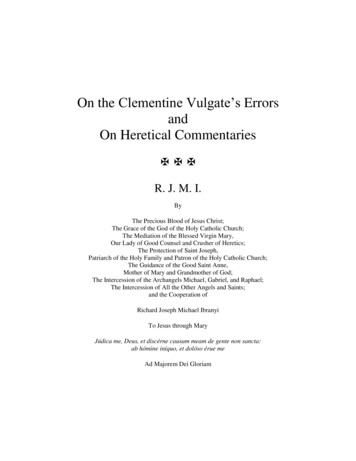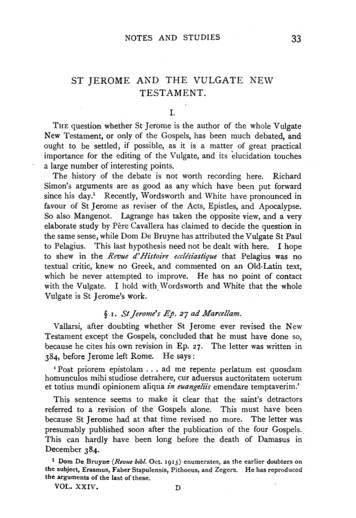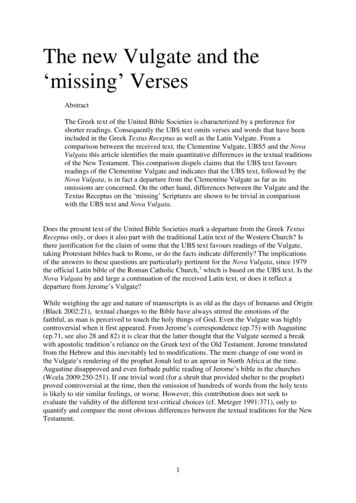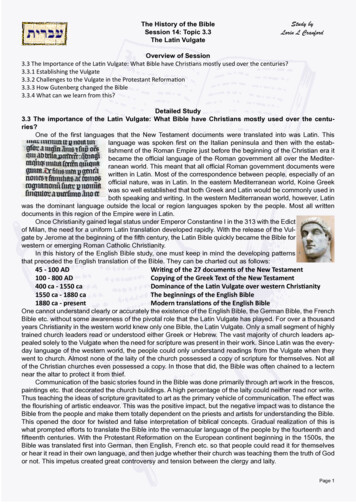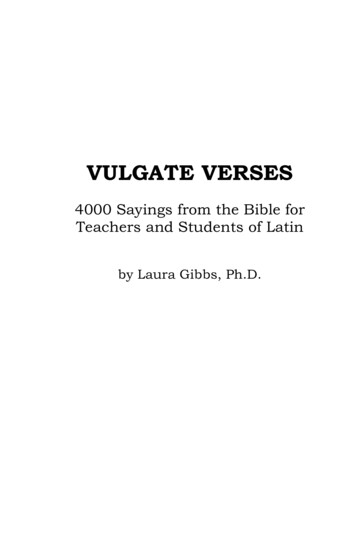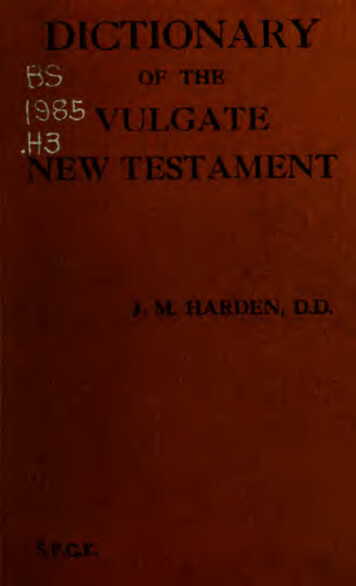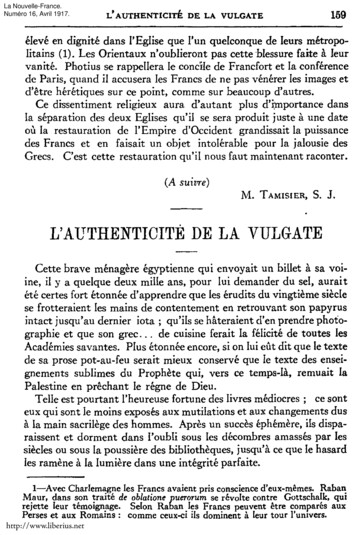
Transcription
Digitized by the Internet Archivein2011 with funding fromUniversity of lgaOOjeps
TheLatinity of the VulgatePsalterByREV. JOHNtheJ.JEPSON,S.S.A DISSERTATIONIn partial fulfillment of the requirements for thedegree of Doctor of Philosophy in theFaculty of Letters,CATHOLIC UNIVERSITYOF AMERICA1915
X4-S tJAN - 8 1944
TheLatinity of the Vulgate PsalterThis dissertation is a study of the Latinity of the VulgatePsalter with a view to determine its similarity to and its variancefrom classic Latin. In the impossibility of measuring it withevery author of the classic period, which would be necessary forthe perfect placing of the Vulgate Latin, the style of Cicero,representing the highest development of the language, has beenassumed as the norm of comparison.Each word has been studied in itself mnd in its relation to thesentence, and the findings set forth in a paragraph under the verseTo this paragraphin which the word makes its first appearance.made when the word is met in later verses. Thecomment on the word shows its current meaning and its literaryreferenceisstanding, alsoitssyntactical peculiarities, supported or contrastedfrom Cicero or by a note on the influence afifectingthe construction. In the marginal column are given abbreviationsbycitationsto enable one to learn at a glance the literary standing of the wordor construction.Such study has been carried to the conclusion of the firstbook of the Hebrew Psalter (psalms I-XL), totaling 635 versesand perhaps iioo separate discussions of words. In a Summaryare gathered into groups the verbal and syntactical peculiarities ofthese forty psalms.This detailed study shows that more than two-thirds of thewords are purely Ciceronian and fully four-fifths are broadlyclassic.There are forty foreign words, ten of which are foundin classic authors fifty-three words rarely used in classic authors,four of these not by Cicero; eighteen words are ante-classic;forty-eight are poetic words which entered prose diction in postAugustan days; twenty-three are words which first appeared inAugustan days thirty-three are words coined after the Augustanperiod fifty-two words coined or introduced by later writers andone hundred and thirty-four words are in Cicero with diflferenceof meaning. There are sixteen words which are found in theVulgate only in these forty psalms.Variations from Cicero's use are, however, far more numerous and striking. This fact is manifest A) in the use ofthe prepositionIt is many times redundantone functions foranother; prepositional phrases appear for i) adverbs, 2)adjectives, 3) simple cases, 4) clauses, 5) simple prepositions,6) to form comparisons; and, contrariwise, simple cases do dutyfor prepositional phrases.;;;;:;
THE LATINITY OF THE VULGATE PSALTERIVB)They appear with governmentin the use of verbs:atvariance with Cicero's a nominative-clause is used seven timesfor an object-clause; transitive verbs are used intransitively;the passive for reflexive the present participle is many times usedas a clause of characterization, or for a finite form which isreadily determined by the finite form in an adjacent parallelclause. As for mood, the gerund appears for a finite clause withits subject in the accusative case; the indicative and subjunctiveappear in parallel grouping of clauses the infinitive is used for apurpose-clause verbs are used to express adverb-relations. Asfor tense, the precision of the classic usage fails occasionally insequence; in three instances the auxiliary of the future-perfectis "fuero"; and in general the tense system is a copy of theHebrew. There are compound for simple verbs, and verbs incertain classical phrases are displaced by others in some conditional sentences the condition is made manifest simply by thereversal of the main and the conditional clauses.The negativeimperative expressed by the modal ''nolle" is rare; there arenegatives with ''non" instead of *'ne", and with a present andperfect subjunctive; there is no ablative absolute. There are alsoindependent words and phrases, obscure clauses, and pleonasms;;;;:andrepetitions.the use of substantives:They serve for i) ad2) clauses, 3) adverbs, 4) pronouns; abstract nounsappear for concrete, and with verbs to render adverbs "anima"with a possessive pronoun does duty, as in Hebrew, for apersonal pronoun.D) in the use of the adjective: There are late formations;some function as substantives comparison is expressed by ia positive and "super", 2) by a comparative and "super", 3)by a prepositional phrase and a verb, 4) by "multum" with thepositive, 5 ) by a repetition of the substantive.E) in the use of the adverb: There are new forms; andsome adverbs constructed as i) substantive, 2) adjective, 3)C)injectives,;;preposition.F) in the use of pronouns: They appear far more frequently than the precision of the classic usage would allow, hencethe pleonastic use of the pronoun as the subject of the verb andwith the possessive adjective; "is" "ille" "ipse" are many timesindiscriminately used, so also occasionally "suus" and "ejus";the demonstrative is frequent for the relative; the phrase "inidipsum", translating iirl rh avVJ and identical with "in unum",carries with it an idea both of time and place, sometimes meaning"together", sometimes "forthwith".G) in the use of conjunctions and particles: The classicchasteness of discrimination is not to be found.H) in point of gender: There is a masculine for a neuter
VTHE LATINITY OF THE VULGATE PSALTERa feminine for the neuter of pronouns (three times)"abyssus" and "dies" have both mascuHne and feminine agree(twice);;ment.There is a nominative pendens; apoint of case:with it; a genitive for a prepoorvocativenominative for afor a clause; a genitive of aadjective,sitional phrase, for anrepeated substantive to intensify the substantive, or to expressa superlative; a dative for a genitive; a dative after passiveverbs; a dative independent; a dative of the personal pronounfor the possessive pronoun; an accusative of respect; a cognateaccusative an ablative to mark duration of time.There are unusual plural forms,J) in point of number:unusual singular forms, a singular for a collective.There is a miscellaneous lack ofK) in point of concordagreement, and abrupt shifts in gender, person, number, mood,I)in;:andtense.There is a vocative at thewordsand''non" at the end, ''enim" at the endsentence.a vocative at the beginning of aM) There are three instances of attraction; some unusualemployment of i) negatives, 2) spelling, 3) figures. There areinstances of hiatus, anacoluthon, and asyndeton.What is thus set forth cannot be regarded as a study of theLatinity of St. Jerome, for the Psalter of the Vulgate, unlikeother portions of the bible, is not his direct translation, butThe inmerely his emendation of an already existing text.fluence, then, moulding the text of the Psalter lies farther backthan St. Jeromefor the text is the translation of a Greektranslation from the Hebrew.This fact points to a powerfulinfluence which must be considered, since the Hebrew is alanguage unallied with the Greek and Latin, and the translatingwas done when the language of both versions was decadent.Furthermore, it is the translation of a sacred book by believerswhose great care was to preserve in the strictest possible mannerthe character of the original. There attached to it, as theirliturgical hymn-book, the sacredness that attends every ancientreligious ritual and the Hebrew Psalter enjoyed also an additional veneration which arose from belief in its divine inspiration.Greek translation of this Psalter was made sometimebetween 150 and 130 B. C., when need was felt for a vernacularversion to preserve the sense of the sacred text to the descendantsof those Hebrews who had settled among Greek- and Latinspeaking peoples and to whom Hebrew was gradually becominga foreign tongue.L)in the collocation ofend of a sentence:;;;;A Gigot, General Introduction to Sacred Scripture,duction, part ii, pp. 64-65 Crampon, preface, vi. Gig-ot, Special Introduction, part ii, p. 64.;p.130; Special Intro-
THE LATINITY OF THE VULGATE PSALTERviof that day no longer possessed its classic purityand finish; nor did the translators attempt to turn the Hebrewversion for current use had to be done ininto classic Greek.the language of the day. Comparative study shows that this wasthe popular Greek of Alexandria, the StaXcKTo? KoivrjIt can thus be seen that three powerful factors were at workto mould the text: i) the sacredness of the book, which wouldmake for dignity of diction and a close following of the original2) the need of the people, which would call for present words inpresent meanings; and 3) the contemporary Greek, which preFailuresented variations in construction alien to the classics.to appreciate this last factor may perhaps account for the opinionprevalent a generation ago that the maker or makers of theversion which is known as the Septuagint ''knew neither Hebrewnor Greek", an opinion which stands corrected by more recentscholars. It was said, too, that the Greek of the Psalter wasIt cannot, indeed, be deniedthe poorest in the Septuagint.*that there is a close, almost slavish, adherence to the originalThis has been carried even toin both words and constructions.the literal rendition of the preposition, particle, and tense-system,in disregard of idiom and has resulted in confusion of verb-timeand here and there in false renderings of the sense.TheSeptuagint shows also variations from our present Hebrew text,due in part to a different original, in part to the difficulty of textreading, and in part to deliberate substitution. The Hebrew characters are square, and certain words are similar in form andeasily; confusedletters and words followed one another in themanuscript without spacing, and so mistakes in laying off thecombinations might result in meaningless phrases and sentences,which the translator has simply turned word for word besides,no vowel marks were employed in the text from which theSeptuagint was made, and conjecture might sometimes have beenwide of the mark. In other instances words were purposelyread different from the Hebrew, especially where the anthropomorphic terms applied to God appeared bold and shocking. Now, it was from a Greek text so moulded that the Latinversion was made. But just when the Psalter was first turnedinto Latin is not known.There is no history regarding it;conjecture has to be formed from the biblical citations of theearliest Christian apologists who wrote in Latin. Texts from thePsalter quoted by them show substantial similarity in wordingThe GreekA;;*Hake, Sprachliche Erlauterungen zu1872, p.demlateinischen Psalmentexte,5- LeHir, Les Psaumes traduits de I'Hebreu, 1876, preface, xxxvi. Drum, in the Catholic Encyclopedia, under 'Tsalms." Crampon, preface, v. Le Hir, note of editor, preface, xi.'LeHir, preface, xxxvii.'Gigot, General Introduction,1.c.
THE LATIN IT Y OF THE VULGATE PSALTERvHthat suggests if it does not actually point to a common source,which, therefore, must have been made about the middle of thesecond century of our era. These citations, reaching us throughwriters of northern Africa show in point of style the crudenessand provincialisms of their current vernacular, and indicate origincannot determine at the present time whetherin that country.Wepassed to southern Europe or whether in Italy, Gaul,and Spain other versions spra;ig up independent of the African.There are but fragmentary citations on which to base judgment.It is plain, though, that in these translations there is "a. mostminute observance of the order and an accurate reflection of thewords in the original, and in many cases the very forms of theGreek construction are retained in violation to the Latin usage." The European versions show a more polished and idiomatic formthan the African, due perhaps to difference in culture on the partof the translators or the people for whom translation was made"in both, corruption of text rose from the natural difficulty ofthis versiontranscription and from deliberate interpolations by scribes andcommentators referring to or interpreting a preferred original.The resultant variations in the texts made manifest the need ofmore stringent supervision and an official recension was undertaken in the early part of the fourth century in northern Italy.This is perhaps the foundation of what we now speak of as theThis recension affected profoundly the AfricanItala version.Psalter about the year 350.* But this Itala text was not the onlyreceived version there were many unofficial texts, which withtheir variant readings reacted on this official text so that towardsthe end of the fourth century there was such confusion that a.radical recension was again necessary.Besides the diction ofthese early versions was felt to need improvement, since the cir;cumstances which had produced them had given them a popularcolloquial coloring ill-suited for dignified homilies and quotationin apologetic and moral writings of a literary tone.Yet, not-withstanding repeated calls for correction, decisive steps towardsreform were taken only in the year 383, when Pope Damasuscommissioned his friend, St. Jerome, to make an emendation inthe hope that a recension sanctioned by papal authority wouldone text. The great extent to which thePsalter had entered the religious life of the people made themaverse, however, to any decided change in the text, and St.effect the recognition ofJerome hadto content himselfwith a cursory correction of the'Westcott, in Smith's Dictionary of the Bible, "Vulgate,"Capelle, p. 180; Burkitt, Texts and Studies, 1896, Vol. iv, 3, p.'p.5,3453cf.pp.II, 15, 55.""Burkitt,intheEncyclopedia Biblica,col. 4993. Westcott,*Capelle,1.c, p. 3453, No. 6.c, p. 120; 117 sq: 187.1.1903,'Texts and Versions,"
THE LATINITY OF THE VULGATE PSALTERVlll*'Licet cursim magna illud exgraver mistakes of the Itala.Perhapscorrexeram." wesee a vestige of this prejudicepartefor the older text in the presence in the psalms of words notfound elsewhere in the Vulgate, marked in this study as aira The revision put forth was adopted for use in theXeyofievachurch at Rome, whence it derived its name Psalterium Romanum. But almost immediately the text suffered at the handsof copyists and interpreters who were familiar with the receivedtext and were loath to depart from it: "scriptorum vitio depravatum, plusque antiquum errorem quam novam emendationemvalere".- This fact led St. Jerome to a new and more thoroughrevision, which showed by symbols the sources whence he drewfor his alterations, and in 392 he produced a second recension,known as the Psalterium Gallicanum, from the fact that thechurch in Gaul accorded it heartiest welcome. About the endof the fourth century St. Jerome brought out a third Psaltertranslating directly from the Hebrew.When the Tridentineedition of the Bible was preparing, the commission in charge ofthe work selected the Psalterium Gallicanum as the official textfor the Psalter. They sought, as the present biblical commissionunder Cardinal Gasquet is seeking, to produce the authentic textof St. Jerome, which had here and there faded during its manuscript life of more than a thousand years.The text as fixed bythem and their immediate successors under Clement and Urbanis the subject of the present study.This sketch of the history of the Psalter will suggest thevarious influences which moulded it.It is natural to supposethat among the Hebrews living in Alexandria the popular Greekof the city was, in a measure, corrupted even prior to the translation of the Bible, from the very fact that the Hebrew mode ofthought and manner of expression differ so widely from theHellenic.This corruption is shown beyond question in thetranslation. And, owing to the close translation of the Latin fromthis Hebraised Greek, the Latin version preserves the Hebraisms.Perhaps the most conspicuous of these is the treatment of theverb.In most instances the tense-form of the Vulgate mustnot be interpreted as in a work of purely Latin origin, but as itreflects the Hebrew idiom.''Strictly speaking there are no tensesin Hebrew.The fundamental idea that causes difference in theverbal flection is that of complete and not-complete action. Thecomplete action or state is expressed by the perfect, and theincompleted by the imperfect. The terms 'perfect' and 'imperfect'must be taken here in their etymological sense and not in thesense which they have in our modern languages. This complete.*Praef. in Lib. Psal.cf. Jer. Praef. in Psal.'Westcott,1.c,p.3461.Westcott,1.c,p.3478; Kaulen, preface,3, 4.
THE LATINITY OF THE VULGATE PSALTERIXness or incompleteness must be judged, not merely from the viewpoint of the writer or reader, but also, and mostly, from therelation that one action has to another and from the nature of theaction or state; thus, the perfect denotes what is concluded orwhat is represented as concluded, though it may be present oreven future. The imperfect denotes the beginning, the unfinished,the continuing, the habitual or often-repeated, or that which isconsidered as in the process of beginning. Hence it would bebetter to speak of the perfect or imperfect state than of a perfectNow, the transor imperfect tense ( :time, from tempus)". verbaccordinggiventheto the significasometimeslators havetion, sometimes according to the form, with the result that thetext presents, in addition to the normal Latin tense-signification,A) the perfect and imperfect equivalent to i) the present, whenthere is an idea of a past action, or a repeated action, abiding inthe present; 2) the future, when the action is conceived of as'over, a prophetic future; B) the future equivalent to i) thepresent, when a general statement is set forth or a customaryaction is stated; 2) the imperative (optative or potential) 3) thepreterit, when the state of the past action is regarded as not yetover or fulfilled, especially in passages of lively description; C)the present participle equivalent to a finite form, especially whenthere is a general statement to be made, or a characteristic act, aquality, an abiding situation to be announced.In many a case,however, the only recourse to determine the true value of theseforms is to seek it in the context. Another Hebraism touchingthe verb is the repetition in present-participle form of a finiteverb to intensify that finite form also the use of a verb withanother to express some adverbial modification of that verb.further influence of the Hebrew mode of expression in the LatinPsalter is shown in the use of the preposition, as the Summaryreveals, so divergent from the classical usage.Though by nomeans is that divergence attributable solely to the Hebrew influence, still the influence is unmistakable in such phrases as '*afacie oculorum, etc.," '*non est in morte", "loqui ad eos", "injustitia judicare, etc.," and in the use of the preposition especially**super" to form comparison, and in the abridgment of a clauseinto a prepositional phrase.Again, much of the use of substantives to qualify substantives the repetition of nouns in placeof pronouns, and demonstratives in place of relatives; also thefeminine for the neuter of pronouns, is Hebrew.In addition to such influences, the Latin version shows alsothe influence of the Greek translation first of all in the almostidentical collocation of words then, in the transparent rendering;;A;:; By courtesy from the forthcoming 'Trogressive Lessons in Hebrew,"by the Rev. H. Butin, S.M., Ph.D., of the Catholic University of America,pp. 58-9, No. 173. Hake, pp. 12-13.
THE LATINITY OF THE VULGATE PSALTERXof the text by strikingly equivalent words, many times carriedeven to the neglect of idion and by the introduction now andagain of the Greek word itself.There are, too, Latin idioms which grew up after the days ofCicero. For naturally in the course of time variations crept intothe language, and this Latin text was made to meet the demandsof those who spoke the current tongue. And this current tonguebore traces of many an influence. There was the refinement begunby Greek scholars and patronized by the Scipios which created adivergence between the spoken and the written languagedivergence that became ever more and more accentuated. Thisliterary development of the language was promoted by suchwriters as Lucretius, Catullus, Sallust, and Caesar, and carriedto its highest perfection in prose by Cicero and in verse byHorace and Virgil. The popular language developed by accession of words from the fields of commerce and war, and by thewider acquaintance of the masses with men and places. It alsotook on shapes borrowed from the written, it might be a word oran expression, many of which lasted only for a season, someabided for a generation, others passed permanently into commondiction.Such processes of adoption insensibly elevated the toneof the spoken language, and operated along lines of slow, conservative, normal development destined to last longer than thehighly artificial development of the literary language, where, forexample, the poetic and prose vocabularies were in part mutuallyexclusive, and idioms of conversation were rigidly prohibited. With the passing of Cicero such barriers weakened proseand poetry mingled spoken language more than ever becameenriched with borrowings from the literary; and the literarystamped with its sanction many of the idioms of the spokenlanguage.Later when the literary world was seized with thevogue of recurring to preclassic forms, archaisms passed naturally into its diction.When Christianity came, its new doctrines demanded new words or new meanings fitted to old wordsand it was just at the time of the early Christian apologists, whowere steeped in the lore of the classics and made appeal in therhetorical mannerisms of the day to the lettered and the unlettered, that the Psalter was translated.In the history of thelanguage it remains a problem whether this translation was afaithful copy even of the spoken language of the day.Its turnof Greek and Hebrew expression may not have been Latin butonce made and circulated these original mistakes may have foundcurrency in the language and by their influence of direct copy oranalogy have contributed to the further decadence of Latin in;—;;;subsequent ages. Abbott,page 2,People.The Common Peopleand here and thereof Ancientin the chapter,Rome, 191 1,The Latin ofpp. 42-44;thecf.Common
THE LATINITY OF THE VULGATE PSALTERXIBIBLIOGRAPHY.Psalterium GalHcanum Sti. Hieronymi, apud Migne OperaHieronymi, Vol. lo.Psalterium Romanum Sti. Hieronymi, apud Migne OperaHieronymi, Vol. lo.Psalterium juxta Hebraicam Veritatem Sti. Hieronymi, ibid.,Vol.9.Psalteriumnovumetvulgatum, ex recensioneMDXLV,RobertiStephani.Les Psaumes, Le Hir. Paris, 1876.Le Livre des Psaumes, Crampon. Tournai, 1889.The Triglot Bible, Hebrew, Greek, Latin. London, 1890.Liber Psalmorum, Amelli (Casiensis Codex). Rome, 1912.The Vulgate Psalter, Macauley and Brebner. London, 191 3. La Sainte Bible commentee. Pillion. Paris, 1892.The Psalms, Kirkpatrick in the Cambridge Bible for Schools andCambridge, 1892.Colleges.New York, 1906.International Critical Commentary, Briggs.Psalmen der Vulgata, Hoberg. Freiburg, 1906.The Psalter of the Church, Mozley. Cambridge, 1905.Liber Psalmorum, Van Steenkiste. Bruges, 1886.Introduction in V. T. Libros Sacros, Cornely.Paris, 1891.Le Texte du Psautier en Afrique, Capelle. Rome, 1913.Itala und Vulgata, Ronsch.Marburg, 1875.Handbuch zur Vulgata, Kaulen. Freiburg, 1904.La Latinite de S. Jerome, Goelzer. Paris, 1884.Le Latin de S. Cyprien, Bayard. Paris, 1902.De laLatinite desPeres deTEgliseWordSermons delatine,S.Monier.Augustin, Regnier.Paris, 1886.Paris, 1912.Sermo Plebeius, Cooper.Formation in the RomanNewYork, 1905.Thesaurus Linguae Latinae.Harpers' Latin Dictionary.Handlexikon zu Cicero, Merguet. Leipzig, 1905.Lexikon zu den Reden des Cicero, Merguet. Jena, 1884.Archiv fiir Lateinische Lexikographie und Grammatik, Woelfflin,editor.Leipzig, 1884-1902.Lateinische Grammatik, Stolz und Schmalz.Muenchen, 1910.Syntax Latine, Riemann. Paris, 1908.Latin Grammar, Hale and Buck.Chicago, 191 5.Ciceronis Scripta quae manserunt Omnia, Mueller. Leipzig, 1898.
XllTHE LATINITY OF THE VULGATEPSx\I-TERABBREVIATIONS.In marginal column.Cic.Sem.Purely Ciceronian word in the sense here used.The word has undergone, and here shows, a changeCic, Adj.Cicero uses theCic.inmeaning since Cicero'swordtime.as an adjective.Non-Cl.Cons.Ante andPostPoet andPostAug.The construction is not according to classic usage.The word was used by the poets and came into generaluse in post-Augustan days.The word is not common in the classics.The word was coined or introduced intoliteraryworksabout the time of Augustus.Post-Aug. The word first appears in literary works sometimethe first century of our era.LateThe word is mainly of the second century or after.Heb.Infl.Hebrewinfluenceisshownin the on.Go el.Goelzer.H.Harpers' Latin Dictionary.Hale and Buck.Hoberg.St. Jerome.Kaulen.The Septuagint Version of the Bible.Merguet.Ronsch.H.&B.Hob.Jer.K. Kaul.LXX.M.R.Ron.Riem.Riemann.S.&S.Stol.&Sch. Stolz and Schmaltz Latin Grammar.Works.Cicero.Acad. Ac.Agr. Agr. Leg.de Amic.Arch.Att.Academicae Quaestiones.Orationes de Lege Agaria.de Amicitia.Oratio pro Archia.Epistulae ad Atticum.in
THE LATINITY OF THE VULGATE PSALTERBalb.Brut.Caecin.CaeLCat.Clu. Cluen.Deiot.Div.Div. in Caecil.Dom.Fam.Ep.Fin.Flac.Har. Resp.Inv.Invent.Leg. de Leg.Leg. Man.Lig.Man. Leg.Marcel.Milo.Mil.Mur.N. D.Off. de Off.Opt. Gen.Orat.de Orat.Par. Par. Stoic.Part. Orat.Phil.Pis.Plane.Prov. Cons.Qiiinct.Ou. Fr.Rab. Perd.Rep.Rose. Amer.Rose. Com.de Sen.Sest. Sex.Sull.Top.Tull.Tusc. Disp.Verr.XlllOratio pro Balbo.Brutus sive de Claris Oratoribus.Oratio pro Caecina.Oratio pro Caelio.Oratio in Catilinam.Oratio pro Cluentio.Oratio pro Rege Deiotaro.de Divinatione.Divinatio in Caecilium.Oratio de Domo Sua.Epistulae ad Familiares.de Finibus.Oratio pro Flacco.Oratio de Haruspicum Responsis.de Inventione Rhetorica.de Legibus.Oratio pro Lege Manilia seu de Imperio Pompei.Ligurio.Lege Manilia.Marcello.Milone.Oratio proOratio proOratio proOratio proOratio prode Naturade Officiis.de OptimoMurena.Deorum.Genere Oratorum.Orator ad Brutum.de Oratore.Paradoxa Stoicorum.de Partitione Oratoria.Orationes in Antonium.Oratio in Pisonem.Oratio pro Plancio.de Provinciis Consularibus.Oratio pro Quinctio.Epistulae ad Quintum Fratrem.Oratio pro Rabirio Perduellonis Reo.de Re Publica.Oratio pro Sexto Roscio Amerino.Oratio pro Sexto Roscio Comoeda.de Senectute.Oratio pro Sestio.Oratio pro Sulla.Topica.Oratio pro Tullio.Tusculanae Disputationes.Actio in V'errem.
TheLatinity of the Vulgate PsalterBeatus vir qui non abiit in concilio impiorum et invia peccatorum non stetit et in cathedra pestilentiaenon( if.(7icsedit.—Beatus Happy. This participle, from "beare", to makehappy, is classical and of frequent occurrence. *'Beare" in thefinite forms of the verb is confined mostly to poetic diction.—Man.the classic appellation of a distinto ''homo", the generic name for*'man". ''Vir" also is employed when man and woman areavrjp asIt is the equivalent of the Greekcontrasted."homo" is of dvOpwiro his is a literal translation of the LXX.qui.the substantive and turn the phrasewouldomitLatinsThe"beatus qui", as in Ps. 31, i, "Beati quorum remissae suntiniquitates", or would employ a demonstrative as Horace,Beatus virEpod,Cic.man2, I,"Beatusillequi."—"Hasnot turned aside from."In Cicero it isfound i) without modifiers, or 2) with a terminus a quo (expressed with a simple ablative, or "ab", or "ex"), or 3) witha terminus ad quem (expressed with "in" plus accusative;or "ad"; Ros. Amer. 16, 47). Here it translates 7rop v rj which at times has the sense of "ambulare". This fact hasled some critics to read "abire" here as "ambulare", Hake,p. 22, supporting their contention by the modifying phrase"in concilio", which is foreign to "abire". Cram. 34, text;C. B. 2, text and note. It is well, however, to remember theclose following of the original which marks the work of theearly translators, and see inAbiitAbiit in concilio, a literal rendition of the post-classiccv with a dative to mark movement towards andrest in, after verbs of motion.According to Cicero's usagewe should read "abiit in consilium", as Tert. Pec. 3"Felixvir qui non abiit in concilium".KaulenCf.177, fine printuse of:—under "ambulare".Cic.Via—AThe worde.g.:"Viaway, mode, manner, fashion of doing a thing.in the sense of the text is"Viavitae", Fl. 42, 105iVivendi", Off. i, 32, 118.the Vulgate,;cf.Kaul. 32.Agr.frequent in Cicero, as9,27The word;Sest. 67, 140.is frequent ini-i
THE LATINITY OF THE VULGATE PSALTER2Late—''Sinner, transgressor."The coining of theattributed by Cooper 65 to Tert. Res. Carn. 9.Itsadaptability to convey the theological idea of **sinner" gavecf. K. 86;it great currency among theological writers,Goel. 50 Bay. 23. The word is not in ng the classical period andfor a lorig time subsequent, the use of this word was confined to the poets.Cathedra—Pestilentia"A contagious disease, a plague, a pest". SoCic.Sem.figurativesense, as here, the word is poeticpoet and Cicero. In apost.andCic.Sedit Sedere, to sit, is found in its literal sense very frequently in prose and poetry. Cicero construes it (a) abso"in" plus ablative, (c) "apud" (quoted bylutely, (b)Nonius: Cic. Rep. 3, 28, 40), (d) "inter" (Att. i, 16, 3),(e) "in" plus accusative equals "against someone" (Clu.He employed the word of magistrates in office,38, 105).but in a figurative sense (not frequent till post Augustandays) he did not use "sedere". "Sedere" was used beforeand after Cicero in relation to arm
TheLatinityoftheVulgate Psalter Bythe REV.JOHN J.JEPSON,S.S. ADISSERTATION Inpartialfulfillmentof

